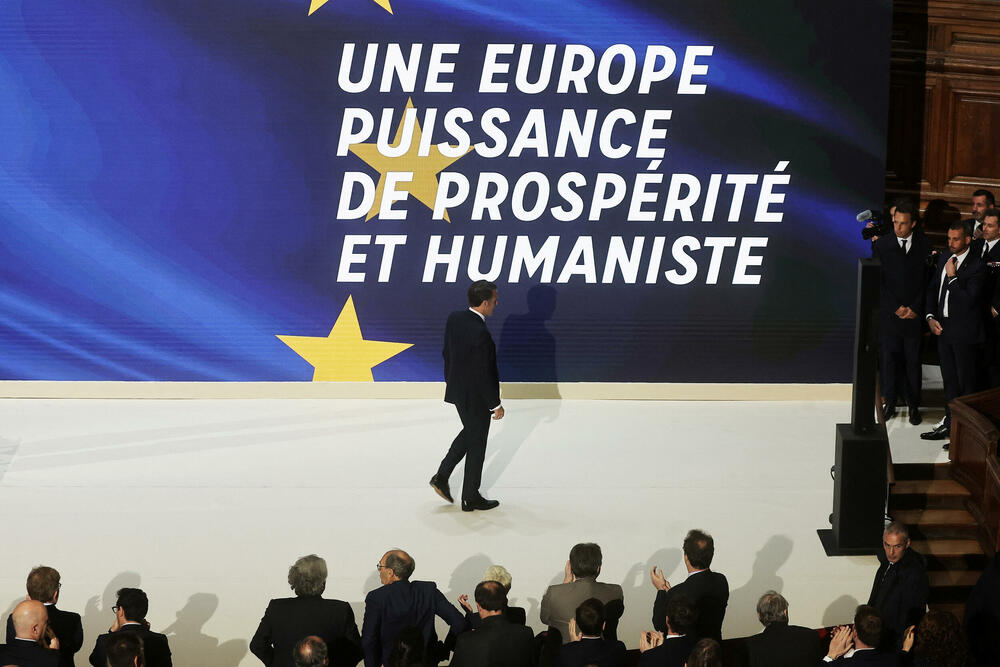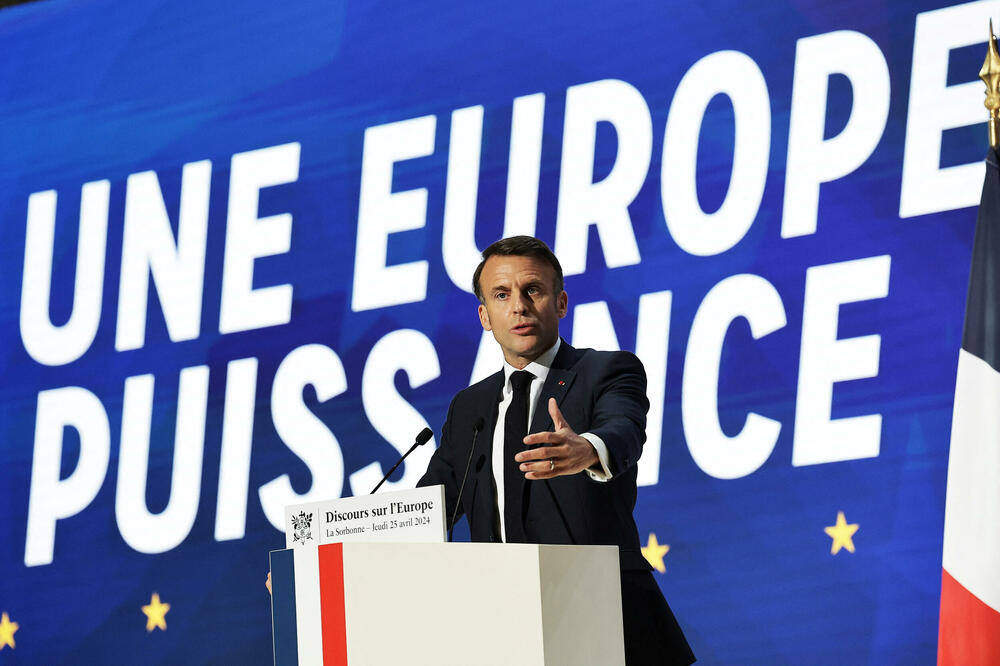French President Emmanuel Macron called for a stronger, more integrated European defense on Thursday as he laid out his vision for a more assertive European Union on the global stage. With three years left in his second and final term, the 46-year-old Macron wants to show critics that he still has the energy and fresh thinking that helped him to the presidency in 2017, and that he did not become a leader without real power, assesses the Reuters agency.
In a speech at Sorbonne University, Macron, who is facing a rise in the popularity of the far right at home, warned that military, economic and other pressures could weaken and split the 27-member bloc. He also said that the continent must not become a vassal of the United States.
The nearly two-hour speech reflected Macron's belief that only a strengthened "sovereign" European Union, which he calls a "European power," can save the continent from strategic irrelevance in a volatile world dominated by the United States and China and facing wars in Europe. and in the Middle East.

"There is a risk that our Europe may die. We are not equipped to face those risks," said the French president.
The French leader hopes his speech yesterday will have the same impact as a similar address at the Sorbonne seven years ago that preceded significant changes in EU policy. Macron then, as the "New York Times" reminds us, spoke about the future of Europe and the European Union as a young, recently elected and energetic president. Today, without an absolute majority in parliament, at a time when his popularity is declining after seven years in office, he has become a divisive figure and has been trying to define the direction of his second term for the last two years.
The decision to speak in such an open way, less than two months before the elections for the European Parliament, is largely seen as an attempt to give a boost to his centrist Revival party, which, according to surveys, is lagging behind the right-wing National Gathering led by Žordan Bardel.
Macron described a world "at a turning point" in which Europe can no longer rely on America for security, on Russia for energy and on China for industrial production and must become strategically autonomous, technologically innovative and militarily resilient. Macron reiterated his support for the creation of a European "rapid action" force of around 5.000 soldiers, which was presented to the EU in 2022 as a way to respond to external crises. It is expected to be fully operational by 2025. He also expressed support for the creation of a "European military academy" to improve coordination between European armies. EU member states, he said, should prioritize the purchase of European military equipment over foreign material. "We are too slow and not ambitious enough," he said, suggesting that only through "strength, prosperity and humanism" can Europe set a recognizable model for the world.
With yesterday's speech, Macron wants to show critics that he still has the energy and fresh thinking that helped him win the presidency in 2017, and that he has not become a leader without real power.
Many EU officials believe that there is currently no credible alternative to American military protection, the British agency points out.
Much has changed since Macron's previous speech at the Sorbonne, with geopolitical challenges including the Gaza war, Russia's invasion of Ukraine and disputes between China and the US. Also in the wake of the covid pandemic, Germany abandoned a long-standing position and supported the issuance of joint European debt, and the war in Ukraine has prompted an increase in European defense spending, something Macron has long sought to reduce reliance on American military power.
However, always impatient with what he considers lazy thinking, such as when he said in 2019 that NATO was "clinically dead" because it had not adapted to the changed world, Macron often irritated certain European partners with bold statements. Not everyone in Europe is convinced that Macron is the one who should lead the 27-member bloc into a different future, points out the "New York Times" and reminds that recently the always difficult relationship between Macron and German Chancellor Olaf Scholz has been further disturbed by differences regarding the war in Ukraine. . Solac was angered by Macron's statement that the deployment of Western troops in Ukraine cannot be ruled out, for which he said yesterday that he "absolutely stands behind it". "The basic condition of our security is that Russia does not win its war of aggression against Ukraine," Macron said at the Sorbonne.
However, yesterday's speech met with a positive reaction from Solac. "France and Germany want Europe to be strong," Scholz announced on social networks. "Your speech contains good ideas on how we can make this happen."
Macron's aides insist that his address at the Sorbonne yesterday is not part of the election campaign, arguing that it is France's contribution to the EU's strategic agenda for the next five years. That agenda will be defined after the European Parliament elections in June. They said the world crises that erupted after his first address in 2017 showed that Macron was right to insist that Europe should take its destiny into its own hands and free itself from technological and industrial dependence, especially on China and the US.
"Macron believes that Europe's strategic cracks are not only with non-free powers that behave aggressively, but also with the US," Rome Momtaz from the International Institute for Strategic Studies in Paris told Reuters. "He accuses them of advocating unfair competition practices similar to those of China, and thus paralyzing Europe's ability to assert itself as a true global power player," she added.
There is uneasiness in Europe that Donald Trump could win the American presidential elections in November, because of whose "America First" program and skepticism about NATO, there is growing concern about European military and strategic dependence on the US. For Macron, such a development is a kind of confirmation of the justification of his warnings in the last seven years, the "New York Times" concludes.
Bonus video:




